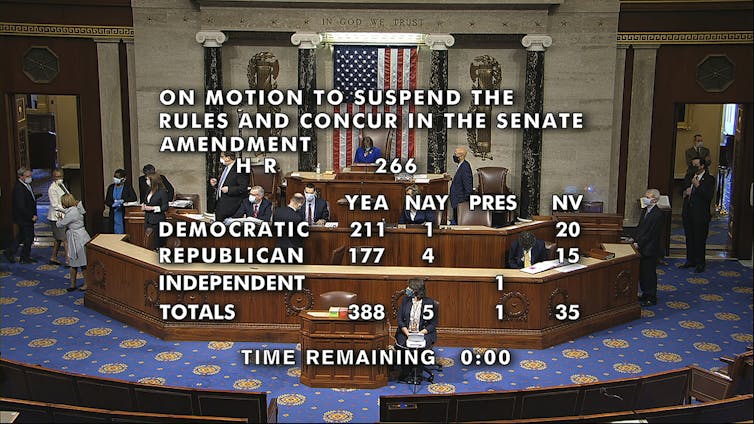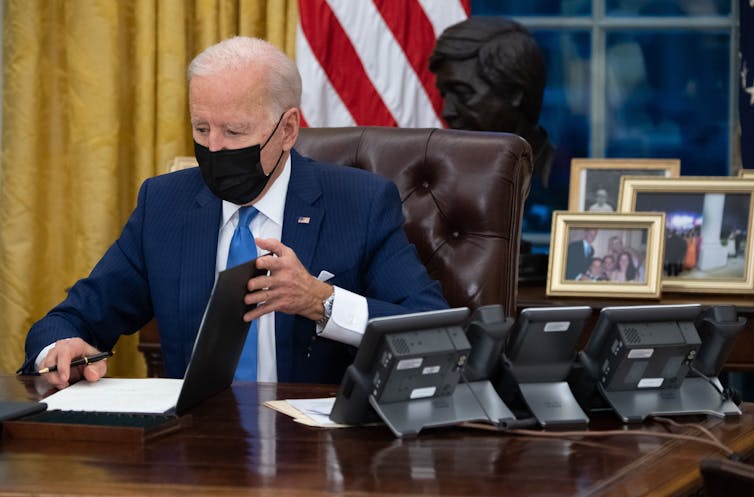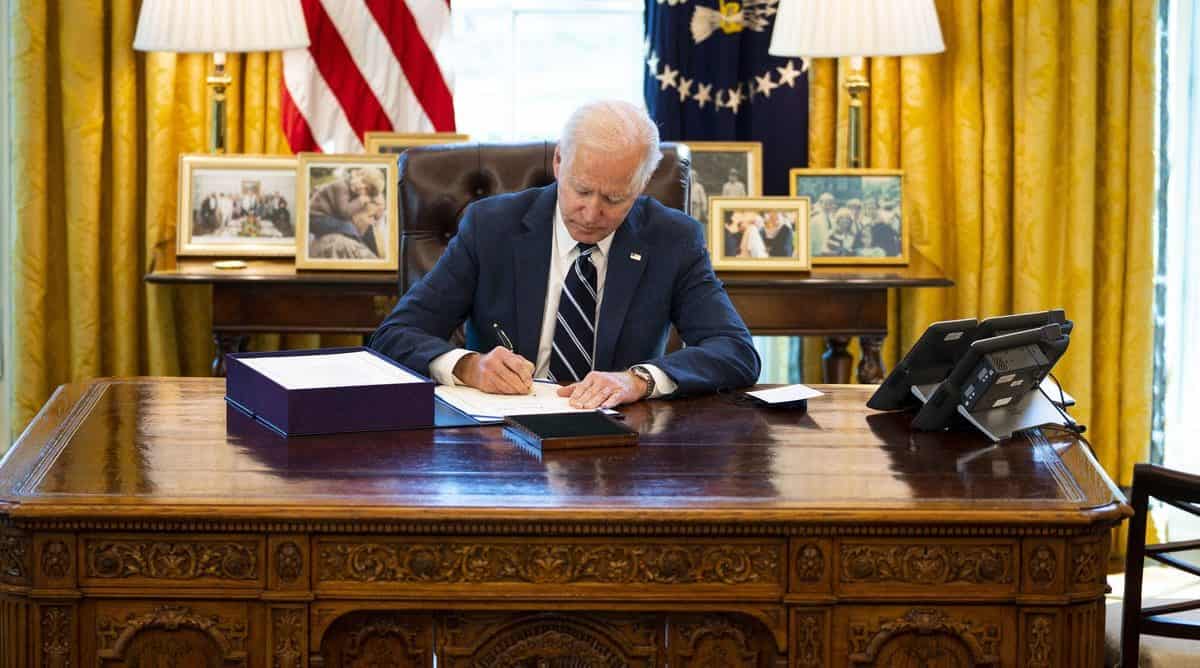Jeb Barnes, USC Dornsife College of Letters, Arts and Sciences
So much for gridlock.
President Joe Biden just signed a nearly $US1.9 trillion COVID-19 relief package. Its swift passage relied on a process known as “budget reconciliation,” which allowed Congress to enact the plan without a single GOP vote.
This massive legislation follows a flurry of executive orders on climate change, immigration, racial justice and more.
Laws and policy are being made in the nation’s capital, despite its reputation as suffering from partisan gridlock.
The fact is that gridlock has always been a myth, resting on half-truths about the legislative process and a basic misunderstanding of how contemporary policymaking works.

Legislative obstacle course
Today’s political environment is undoubtedly difficult for lawmakers who want to pass legislation. Party polarization levels are historically high, and slim House and Senate majorities are increasingly common.
The filibuster, which requires 60 votes to pass bills in the Senate, is now routinely used to block legislation. Under these circumstances, Congress crosses fewer items off its to-do list. Congress’ failure rate on key issues – the percentage of issues that are not addressed on its policy agenda through legislation – has more than doubled from 30% to over 60% since World War II.
Yet there is still significant room to maneuver, and Congress gets more done than you might think .
Consider the 115th Congress, which convened after President Donald Trump’s election in 2016, the last time the same political party controlled the House, Senate and Oval Office.
That Congress enacted 442 laws, the most in a decade. A chunk of these laws were mostly symbolic, enacting such measures as designating national days of recognition. But an estimated 306 – 69% – were substantive, according to the Pew Research Center, including a $1.5 trillion tax cut and bipartisan measures on criminal justice reform, farm policy, the opioid crisis and sanctions on Russia.
This places the 115th Congress on par with earlier sessions, which have passed an average of 311 substantive laws since 1989.
Policy is more than legislation
The gridlock narrative focuses too narrowly on Congress and the bills it does or doesn’t pass.
Policy is the set of principles and goals that guide governmental decision-making. Congress may have the sole power to write new laws, but it does not have a monopoly on making policy.
Most obviously, the executive branch can shift policy through executive orders, which averaged 36 per year under President George W. Bush, 35 under President Obama and 55 under President Trump. President Biden is already up to 37 executive orders and counting. The executive branch also uses less visible means to change policy, such as internal guidance memos, circulars, bulletins and other arcane directives.
These policy initiatives fall outside the normal review processes, which require extensive notice and opportunities for public comment. The Trump administration reportedly issued over 1,000 changes to immigration policy using these methods, helping to slash legal immigration to the United States by half.
There are other avenues of policymaking that bypass the legislative process:
• Sometimes officials engage in “policy conversion,” which means repurposing old laws to new ends. In that way, the law stays the same, but the underlying policy sends it in different and sometimes surprising directions. For example, antitrust laws initially targeted business trusts, forbidding organizational practices “in restraint of trade.” Businesses persuaded federal judges to apply this general ban to unions, directing the law to new targets. Similar shifts of policy from guarding one set of interests to protecting another can be found in consumer protection law , disability policy and social programs.
• Sometimes Washington makes policy by doing nothing at all. President Biden’s original COVID-19 relief package proposed to increase the federal minimum wage, which has remained at $7.25 per hour since 2007. That $7.25 is now worth less than $6 because of inflation. The Senate balked at this provision and it was dropped, although some Democrats have vowed to revisit the issue after the relief package is signed into law. In this example, congressional inaction for over a decade effectively has cut the minimum wage by over 15% and will continue to chip away until a new law is passed. Scholars call this process “policy drift” and argue it has been central to shrinking the functional size of the social safety net since the 1980s.

Policy complexity, not gridlock
The point is that policy can change in many ways, as a house does. Most visibly, you can demolish a house and rebuild it. Often this is impractical, and it’s easier to add a new room. Less visibly, you can remodel, converting a basement or garage without changing the house from the outside. Most subtly, changing circumstances can diminish a house’s usefulness, as when when a starter home fails to keep pace with the needs of a growing family.
Given these dynamics, myopically focusing on Congress and its purported gridlock mischaracterizes the real risk of legislative stalemate, which is not policy paralysis. It is shifting power to bureaucrats and judges, who are less publicly accountable and engage in more obscure and technical forms of policymaking.
After decades of financial decline, the media have fewer reporters who can untangle policy intricacies. It often exacerbates the problem by covering the conflict of the day rather than detailing the less provocative-looking silent progress of behind-the-scenes policy change.
Tracking the often subterranean ways that policy is actually made is admittedly difficult, but it is essential for both holding policymakers accountable and appreciating the political system’s true capacity for change.
This is an updated version of an article originally published on Feb. 17, 2021.
Jeb Barnes, Professor of Political Science, USC Dornsife College of Letters, Arts and Sciences
This article is republished from The Conversation under a Creative Commons license. Read the original article.












